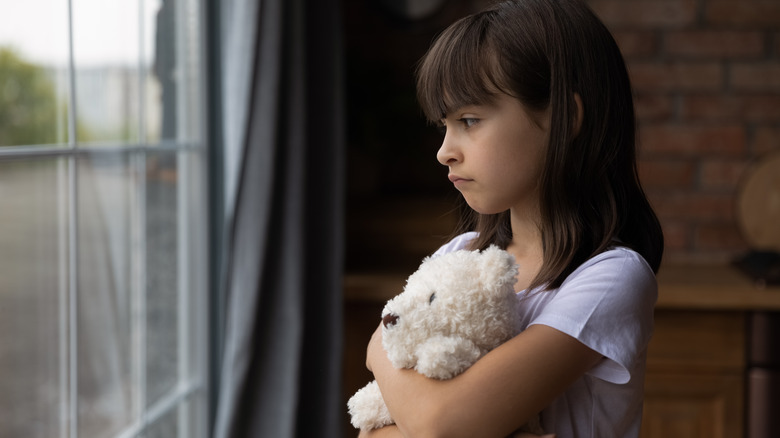The Startling Connection Between Childhood Trauma And Resisting The COVID-19 Vaccine
Trauma that takes place in childhood, including physical abuse, verbal abuse, bullying, the witnessing of domestic violence, as well as experiencing a natural disaster or critical health condition, can all affect the mental, emotional, and physical wellbeing of one during adulthood (via Mental Health Center). The National Child Traumatic Stress Network reports that youth who experience trauma during childhood are more susceptible to mental health difficulties, chronic illness, and are more likely to engage in "high-risk behaviors" like smoking as they move into adulthood (via Mental Health Center).
A 2022 study published in the British Medical Association suggests that experiencing childhood trauma may correlate with a different, unique outcome: COVID-19 vaccine hesitancy. Experts examined the results of a telephone survey conducted between December 2020 and March 2021 containing over 2,000 participant responses from Wales regarding the presence, or lack thereof, of childhood trauma in their lives and the participant's current attitudes towards vaccine regulations. Researchers point out that the study's findings can influence how healthcare systems can best communicate with vaccine-hesitant patients.
The impact of childhood trauma during the pandemic
The study published in the British Medical Journal outlined nine forms of childhood trauma, including physical abuse, verbal abuse, sexual abuse, domestic violence exposure, divorce, living with a family member with mental health difficulties, addiction, and having an incarcerated family member. Survey results showed that 20% of respondents had experienced one of the outlined forms of childhood trauma, 17% had experienced two or three forms of trauma, and 10% of participants reported experiencing four or more traumas.
Researchers found that vaccine hesitancy, mistrust of COVID-19 government information, and resistance to mandatory restrictions increased in relation to the number of childhood trauma experienced. For example, individuals who reported having experienced four or more types of trauma as minors were more likely to express a "desire to end social distancing," according to the British Medical Journal. Similarly, feelings of vaccine hesitancy tripled among those with four or more experiences of childhood trauma compared to those who reported no instances of childhood trauma.
Greater support may be needed from health systems
Study authors emphasize that this correlation does not confirm causation for vaccine resistance and that more extensive and representative research is needed. Still, some experts offer possible theories for the study's findings, saying that the relationship may be due to feelings of mistrust that stem from childhood and feeling a lack of control over the situation (via WebMD). A senior associate program director at Children's Hospital of Philadelphia, Dr. Consuelo Cagande, tells WebMD, "Past traumatic experiences can predispose someone to avoid things that remind them of that trauma. This avoidance protects them from re-experiencing the negative symptoms and behaviors that come with it. Whether this results into hesitancy of something that would benefit their health is not well known."
Study authors suggest that additional support is needed from the healthcare system, which could lead to increased trust, according to the British Medical Journal.
If you or someone you know may be the victim of child abuse, please contact the Childhelp National Child Abuse Hotline at 1-800-4-A-Child (1-800-422-4453) or contact their live chat services.



